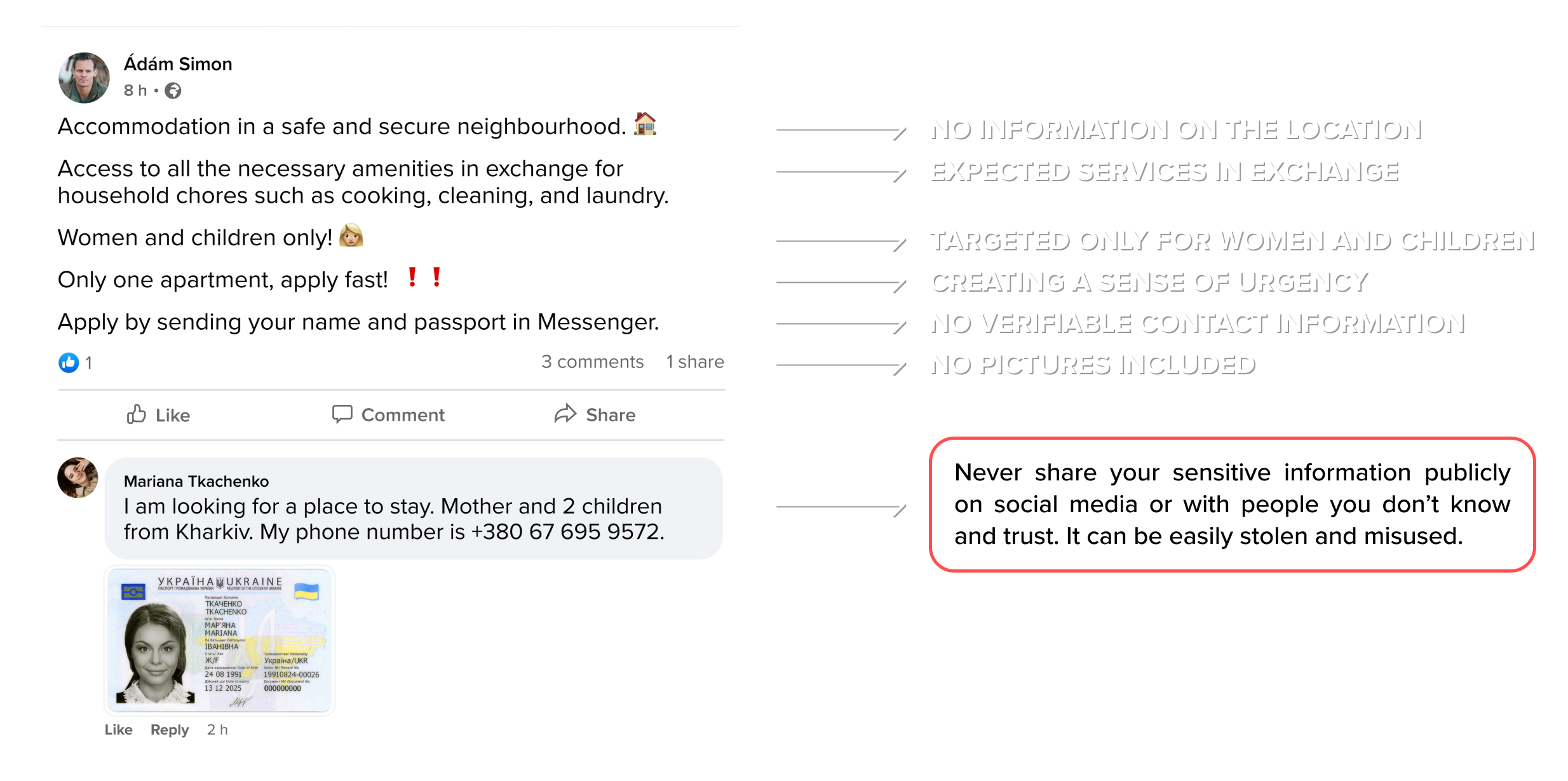You might have found yourself reaching out for help in a Facebook Group, and now you are receiving responses from complete strangers. Or perhaps while browsing through Telegram, you stumbled upon an offer that seemed incredibly beneficial at first glance. Online spaces often present opportunities that appear to be exactly what you need. However, it's important to remember that not everything online is as it appears.
Be vigilant when accepting online offers
While some of the offers may indeed be genuine, others could be illusions, offering a false sense of safety and security. They might ask for money upfront, promising a job or a home in return. They might offer to get you to a new place safely. But when something sounds too perfect, pause and think. Real opportunities don't involve secretive transactions or pressure. They're transparent and give you space to think and decide.
Accepting assistance online requires a balance of openness to help and vigilance against risks. By following some guidelines and listening to your intuition, you can navigate online offers more safely. Remember, taking the time to verify and research before accepting any assistance can make a significant difference in ensuring your safety. When in doubt, always ask for help from people and organisations you trust!
You can safely accept an offer if…
- It’s from a verified, credible source after thorough research and checking through official websites.
- The offering individual or organisation's profile is authentic and legitimate, showing signs of credibility.
- The details in the offer are clear and transparent, providing straightforward and unambiguous information.
- Your intuition agrees with the offer's authenticity, especially if it feels genuine and realistic.
- Trusted community members or experienced individuals confirm the offer's safety.
You should avoid an offer if…
- It contains poor language, such as significant spelling, grammatical errors, or other inconsistencies.
- It’s too good to be true.
- It uses high-pressure tactics or urgency to accept the offer quickly.
- It’s trying to appeal to your emotions.
- Upfront payment is requested in the offer, particularly via untraceable methods.
- It asks for excessive personal information right from the start, like pictures of your passport or financial details.
- It involves cross-border travel or moving away from your familiar surroundings.
Apply safely for financial assistance online
Various forms of financial assistance, provided by governments and humanitarian organisations, are essential support for displaced individuals. These offers can be quite appealing, and the urge to apply quickly is understandable.
However, it's crucial to be aware of criminals who exploit these situations. They often craft scams disguised as 'humanitarian support' or 'quick cash solutions' and promote them on social media. These scams typically impersonate reputable organisations and promise substantial financial aid, like thousands of Euros. When you engage with these offers, they may prompt you to enter your banking details, pay a 'processing fee', or log into your internet banking portal. Unfortunately, if these criminals gain access to your bank account, they can swiftly deplete your funds, leaving you financially vulnerable.
Financial assistance from legitimate organisations is a structured process, with clear information and without requesting anything in exchange. Only approach recognised charities, NGOs, or government programs known for providing financial aid to refugees. Be clear about any conditions or requirements tied to the financial assistance, and ensure all transactions are conducted through official channels with proper documentation.
You should avoid financial assistance offers that…
- Are only advertised on social media, as these platforms often lack proper verification.
- Require you to log into your bank account, even if the website looks really similar to the real one.
- Necessitate transferring money to any bank account, as legitimate assistance should not involve such payments.
- Pressure you to provide sensitive personal information, like pictures of your identification documents.
- Are conditional upon providing services or sexual acts, which are exploitative and illegal practices, without exception.

Safe search for accommodation online
Securing accommodation as a refugee can be a challenging task, especially when relying on online resources. While the internet can connect you with various housing options, it’s essential to navigate these offers with caution to ensure your safety and avoid potential scams and exploitations.
Be careful with offers from private individuals, shared or advertised on social media. Unfortunately, in times of crisis, there are homeowners who are trying to exploit refugees in exchange for a place to stay, and they often use online communities to get in touch with the victims.
Keep in mind that although no online platform can be considered 100% safe, designated accommodation search sites are safer compared to Facebook and similar social media sites. Be aware of warning signs that indicate that the offer is not legitimate or safe. If you encounter any of them, it’s best to decline the offer immediately.
You should avoid an accommodation offer if…
- It’s advertised exclusively for women or underage children.
- The host refuses to share pictures or videos of the accommodation, or if the pictures share seem fake or suspicious.
- The host is putting time pressure on you to accept the offer.
- The host wants to keep your identification documents or your personal items.
- The host asks for any kinds of services from you (such as babysitting or household chores) in exchange for the accommodation.
- The host asks you to go on a date or perform sexual acts in exchange for accommodation.
- The person who meets you is not the same person you have been speaking with previously.
- After speaking with the host, you have doubts about their sincere intentions.
Before meeting with hosts in-person, use Google Maps Street View to examine the property and its neighbourhood, which can reveal any discrepancies or warning signs not apparent in the listing. Share the accommodation link with friends or family for their input and to keep them informed, ensuring you have a point of contact in an emergency.
For a clearer picture of the accommodation and to gauge the host's trustworthiness, request a video call and ask for detailed images of the property and its surroundings. This step not only provides a realistic view of your potential living space but also helps in establishing a rapport with the host.
Be alert to the pricing; if it's markedly lower than similar local offerings, it might indicate a scam. Discuss payment methods with the host and be wary of requests for deposits via untraceable methods like Western Union or MoneyGram, as these are often used in scams.

Safe search for jobs online
As a displaced person, you might find yourself in a sudden need of financial support while being in an unfamiliar location. In these situations you become much more vulnerable to exploitations, especially when you have to interact with complete strangers in order to find and apply for jobs.
Just like with accommodation, it’s best to avoid job offers on Facebook, Telegram, and other social media platforms, and use official, trusted websites for your job search instead. These websites have safeguards in place to protect you from harmful employment offers.
You should always check the employer before applying. See if they are active and professional on social media, and look for reviews from other employees to get a sense of what it is like to work for the company. If you are unsure about the legitimacy of a job posting, consider seeking help from trusted organisations or locals.
You should avoid a job offer if…
- It seems too good to be true, especially with unusually high salaries or generous benefits that don’t align with industry standards.
- The description is vague or confusing, lacking clear details about responsibilities and duties.
- There's no specific contact information for the recruiter or company, particularly if the posting only provides a generic email address (such as @gmail.com).
- An instant offer is made without any interview or vetting process, which is not a standard practice in legitimate recruitment.
- It involves travelling across borders, as this could lead to unexpected risks and exploitations far from home.
- The proposed meeting location is remote or isolated, as this raises safety concerns and is not typical for professional job interviews.

Safe search for private transportation online
When you are forced to flee your home or move onwards to a new place, securing reliable and safe transportation is vital. Moving across borders and arriving in unfamiliar territories inherently carries risks, but with careful planning and vigilance, you can ensure your safety and avoid serious dangers like human trafficking.
It's important to remember that while offers of transportation from private individuals might appear convenient and cost-effective, they generally pose greater risks. Verifying the credibility of these individuals and ensuring they will take you to the agreed-upon destination can be challenging. As a result, it's advisable to avoid transportation offers from private individuals, especially those found on social media, and choose reliable companies instead.
You should avoid a transportation offer if…
- It seems overly convenient or significantly cheaper than standard options, as this could indicate a lack of legitimacy or hidden risks.
- It lacks a formal booking process, such as those operating only through informal methods like social media messages, which often lack accountability.
- It requests advance payments, particularly through non-traceable methods, as this is a common tactic in scams.
- It requires handing over your personal documents, as legitimate services should not require them beyond standard verification purposes and this might limit you in free movement.
Before finalising your travel plans, conduct thorough research on the service provider. Visit their website to verify official registrations or certifications and read reviews or testimonials from other users to gauge their credibility. It's important to protect your personal information during these interactions. Avoid sharing sensitive details such as your family status, financial situation, or personal hardships. Such information can make you vulnerable to exploitation.
Always inform someone you trust about your travel plans. This should include the details of the transportation service you're using, your itinerary, and your expected arrival time. In case of emergencies or unexpected situations, it’s crucial to have a contingency plan.
Keep a list of local emergency contacts handy during your travel. This list should include phone numbers of local authorities, support services, and perhaps the embassy or consulate, ensuring you have quick access to assistance if needed. By following these steps, you can better safeguard your journey and travel with greater peace of mind.


